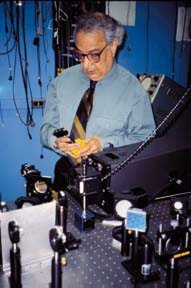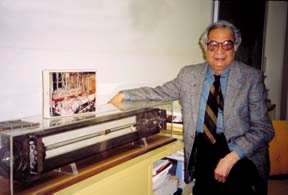|

Winter
1999 (7.4)
Pages
26-27
Famous People:
Then and Now
Ali Javan
Physicist (1928-)
  Ali Javan tested his
"Gas Laser" invention on December 12, 1960. The following
day, he conducted the first experiment of a telephone conversation
ever to be transmitted by laser beam. Nearly 40 years later,
laser telecommunication via fiber optics is commonplace, comprising
the key technology used in today's Internet. Ali Javan tested his
"Gas Laser" invention on December 12, 1960. The following
day, he conducted the first experiment of a telephone conversation
ever to be transmitted by laser beam. Nearly 40 years later,
laser telecommunication via fiber optics is commonplace, comprising
the key technology used in today's Internet.
Javan is still intensely involved with inventions, concentrating
on the use of matter at "nano-scale", specifically
working on electronics at optical frequencies. He anticipates
the day when microchips will operate on light wave frequencies
GHz (Giga-Hertz) rather than the radio frequencies of MHz (Mega-Hertz).
Photo:
Ali Javan,
in his laser lab at MIT
(Massachusetts Institute of Technology). Photo: Blair, 1996.
Born in Tehran of Azerbaijani parentage, Javan came to the United
States in 1949 where shortly afterwards he received his Ph.D.
at Columbia University in New York City. He's been with the Massachusetts
Institute of Technology (MIT) since 1962.
What experiences and interests in childhood would you say
shaped your life and career?
I think my fascination for science originated in my genes. I
was born with it. When I was five or six years old, I was attracted
to sketches and numbers. I started thinking about mathematics
from childhood. It seemed so natural to enter physics when I
grew up. I had no hesitation at all.
As a child, I remember playing with gadgets a lot. Once when
I was about seven or eight years old, I tried to make a camera
from a little box. Now when I look back at some of the things
I was trying to do as a kid, I realize that many of them were
impossible. Conceptually, they violated the laws of physics.
But I tried anyway.
Neither of my parents were involved in science. My father was
a lawyer and wrote a number of books, some having to do with
human rights. My mother was very artistic in spirit. I can't
say that they either encouraged or discouraged me from getting
involved with science. They simply didn't interfere with my interests.
  I attended marvelous
schools in Tehran. I think the teachers must have recognized
something in me. They provided me with a tremendous background
in math and physics and pushed me to explore concepts far beyond
what was offered in the curriculum. I attended marvelous
schools in Tehran. I think the teachers must have recognized
something in me. They provided me with a tremendous background
in math and physics and pushed me to explore concepts far beyond
what was offered in the curriculum.
Photo: Javan in his MIT
office with the original laser apparatus that he invented in
1960. Photo: Blair, 1996.
When I came to the United States in 1949 after finishing high
school, I started taking heavy graduate courses in physics and
math at Columbia University (New York). I was able to get my
Ph.D. in 1954 rather quickly because of my strong scientific
background.
I studied art and music as well. I remember taking music classes
at Columbia with Henry Cowell (1897-1965), quite a distinguish ed
composer. Physics and music-you find the same spirit in both
of them. That spirit is particularly evident when you listen
to composers like Bach. His works are so deeply mathematical
or, perhaps, you might say that mathematics is so deeply "Bachian".
It's especially true when you listen to a Bach fugue or a Bach
Mass in a minor key. ed
composer. Physics and music-you find the same spirit in both
of them. That spirit is particularly evident when you listen
to composers like Bach. His works are so deeply mathematical
or, perhaps, you might say that mathematics is so deeply "Bachian".
It's especially true when you listen to a Bach fugue or a Bach
Mass in a minor key.
But I think I became who I am simply because no one interfered
with the process. I think this spirit of creativity is in all
of us. It just manifests itself in different directions.
There's something immensely beautiful about physics even though
it's very difficult. Take the atom-a single atom is absolutely
gorgeous. Ask anybody in physics. It moves in waves. It's very
dynamic. These days we can study a single atom, track it and
measure it. In the early days when I went to school, it wasn't
possible to see how the atom emits light and sends a blink. It's
such fun! These are the things that really attract you as a physicist.
Of course, hard work is part of it. The hard work is actually
what makes it enjoyable and rewarding. Why do you work hard?
Because there is something very beautiful at the end of the line
that you're looking for. Why are my students doing what they
do? To make money? Yeah, sure, it's science. We make good money.
But there are other ways to make money, too. There's something
much deeper to it. There's an aesthetic element. The whole thing
is aesthetics.
How was your own childhood different from that of kids growing
up today?
I don't think there's really that much difference between them
if we set aside the exposure that young people have these days
to media and high tech. Sure, the environment is different, the
exposure is different. Today they have TVs, computers and a lot
of technical things that we didn't have then. But in terms of
childhood being different, loving parents are the same in any
age. When I was growing up, you could have been born into an
environment that was terrible, just as you can today. I'm not
at all pessimistic about the youth today. Oh no! I see what they're
doing since I'm surrounded by them at the university. I can tell
that our childhoods were essentially the same.
What advice would you give to young people as they enter the
21st century?
We are born who we are. Environment can only influence us up
to a certain point, but not all the way, that's for sure. If
I wanted to give advice to young people, I would just say: "Follow
your bliss and live creatively. Listen to your heart."
All of us are involved in this process of creating. It doesn't
have to be anything high-tech or some sort of gadget. What happens
is, we create what, without us, would not be-would not exist.
We all take part in nature's creative process. So my advice to
young people as they seek out a career is to follow what attracts
you, not what sounds attractive. Live creatively and you'll find
that you can live comfortably and make good money. And if what
attracts you is to make a lot of money, well then, go ahead and
make a lot of money. That's fine. But living creatively is what
will give you that "high" that makes it all worthwhile.
What would you say is your greatest achievement in life? What
do you want to be remembered for most?
That's really difficult to answer. A number of things come to
mind. Of course, I'll be remembered for the gas laser (1960s).
It's been so meaningful to be able to make atoms emit light in
new ways, making them do things that they wouldn't do by themselves-creating
things that wouldn't happen on their own. Some of these inventions
will turn out to be very worthwhile and will impact industry
and technology. Not everything that we do as creative spirits
makes it to the stage where everybody can benefit, but when such
an occasion occurs, it's immensely satisfying.
Ali Javan was
interviewed by telephone in his home at Cambridge, Massachusetts
by Betty Blair. For more about Javan, see "Scientists
Who Made a Difference: Ali Javan, The Gas Laser and Beyond" in AI 4.2, Summer 1996.
From Azerbaijan
International
(7.4) Winter 1999.
© Azerbaijan International 1999. All rights reserved.
Back to Index AI 7.4 (Winter
1999)
AI Home |
Magazine
Choice
| Topics
| Store
| Contact
us
|